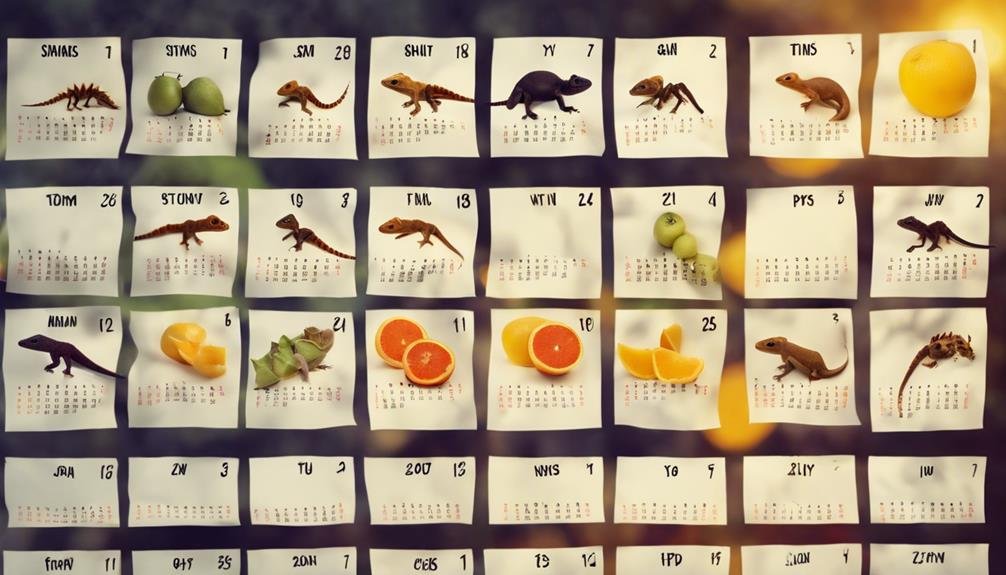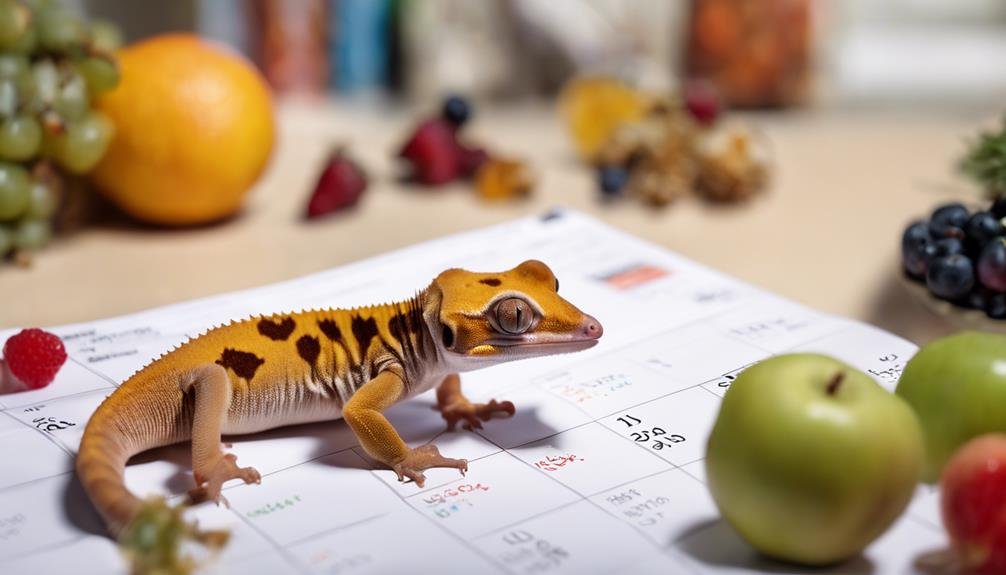You might think feeding crested geckos is straightforward, but their dietary needs can be quite nuanced, varying greatly with age, health, and lifestyle. While baby geckos demand daily nourishment to support their growth, adults thrive on a less frequent schedule, eating every 2-3 days. However, did you know that the feeding frequency for pregnant or breeding females adjusts to even more often to meet their higher nutritional demands? This complexity in their feeding regimen opens up a fascinating discussion on the importance of tailoring their diet for best health. Let's explore how these adjustments can impact their well-being in ways you might not expect.
Key Takeaways
- Baby crested geckos require daily feeding to support their growth.
- Adult crested geckos should be fed every 2-3 days for optimal health.
- Pregnant or breeding females may need more frequent feedings.
- Live insects are typically offered to crested geckos about once a week.
- Adjustments to feeding frequency may be necessary based on the gecko's health and activity level.
Understanding Crested Geckos
Properly caring for crested geckos requires a good understanding of their omnivorous diet, which includes insects, fruits, and commercial diets tailored to their unique needs. Crested Gecko Care is more than just providing a warm habitat; it's about guaranteeing their dietary needs are met with precision. These little creatures thrive on a variety, making it essential to mix up their diet to prevent nutritional deficiencies. Incorporating insects like crickets or mealworms, along with mashed fruits and specially formulated gecko diets, ensures they receive all the necessary vitamins and minerals.
Since they're omnivores, you've got to balance their intake between animal and plant-based foods. This balance is vital not just for their physical health but also for their overall well-being. Monitoring your gecko's body condition is a key aspect of Crested Gecko Care. It helps you adjust their diet to avoid obesity, which is a common issue in captive geckos. Remember, a healthy gecko is an active and engaging pet, making your commitment to their diet a central part of their care routine.
Feeding Frequency Explained
Now that you're familiar with the basics of crested gecko care, it's important to tailor their feeding schedule based on age, health, and dietary preferences. Whether you're adjusting the types of foods offered or tweaking the frequency to suit their health needs, getting it right plays a vital role in their overall wellbeing.
Let's explore how you can optimize your pet's diet for a happy, healthy life.
Age-Dependent Feeding Schedule
Understanding how often to feed your crested gecko depends on its age, as their dietary needs change from baby to adult. A care sheet might suggest daily feedings for baby geckos to support their growth and development.
As they reach juvenile status, you'll adjust their feeding schedule to every other day, helping them adapt without overfeeding.
Adult crested geckos do well with a meal every 2-3 days, ensuring they maintain a healthy diet without becoming overweight. If you're caring for a pregnant or breeding female, she'll need more frequent feedings to sustain her energy.
Always monitor your gecko's weight and behavior to determine if the feeding schedule you're following suits their needs.
Types of Food Choices
When planning your crested gecko's diet, it's crucial to vary their meals to make sure they receive all the necessary nutrients. Incorporating a mix of fruit, Crested Gecko Diet (CGD), and insects provides a balanced diet that caters to their nutritional needs. Here's a simplified guide to what your gecko's feeding routine could look like:
| Day | Food Type | Notes |
|---|---|---|
| Tuesday | Crested Gecko Diet | |
| Thursday | Crested Gecko Diet | Add variety with different fruit mixes |
| Sunday | Crested Gecko Diet | |
| Once a week | Insects (e.g., crickets) | Dust with calcium with D3 bi-weekly |
Leave food in the enclosure to encourage foraging. This routine ensures your crested gecko gets a well-rounded diet, promoting health and vitality.
Adjusting for Health Needs
In order to maintain your crested gecko's health, it's important to adjust their feeding frequency according to their specific needs. Feeding your crestie every other day offers ideal nutrition, but it's also essential to mix in insects about once a week for variety and essential nutrients.
To prevent metabolic bone disease, dust crickets with calcium with D3 once every other week. This guarantees your gecko gets the proper calcium intake. Establishing a consistent feeding schedule, such as offering CGD diets on set days like Tuesday, Thursday, and Sunday, helps keep things regular.
Juvenile Dietary Needs
As you explore the dietary needs of juvenile crested geckos, it's essential to understand the importance of feeding frequency variations to support their rapid growth.
You'll also need to focus on their preferred diets, incorporating both live insects and nutritional supplements to make sure they're getting all the necessary nutrients.
Keeping an eye on these aspects is key to fostering their development and overall health.
Feeding Frequency Variations
Juvenile crested geckos need daily feeding to support their rapid growth and development. At this stage, their metabolism is on the higher side, necessitating a balanced diet that can meet their nutritional demands efficiently.
To keep your young gecko healthy and spry, consider the following:
- Offer a variety of gut-loaded insects and commercial gecko diets to guarantee a well-rounded intake.
- Keep an eye out for signs of overfeeding or obesity, which could negatively impact their health.
- Gradually adjust their feeding frequency to align with the adult crested gecko schedule as they mature.
Preferred Juvenile Diets
To support their rapid growth, you should feed your juvenile crested geckos a varied diet daily, including live insects and commercial foods. Offering a variety of live insects, such as small crickets, roaches, and fruit flies, guarantees your juvenile geckos receive the essential nutrients they need for development.
While the specifics of supplement dusting fall into another discussion, it's vital to provide these insects regularly. In addition to live prey, incorporating commercial crested gecko diets 3-4 times a week helps balance their nutrition, giving them a well-rounded intake of necessary vitamins and minerals.
It's important to monitor your juvenile gecko's growth closely and adjust feeding frequencies to meet their individual needs, ensuring they thrive and develop properly.
Nutritional Supplements Essential
Ensuring your juvenile crested geckos receive the right nutritional supplements is important for their bone development and overall health. Since your crested is in a critical growth phase, it's essential to cater to their dietary needs adequately. Here's how you can make sure they're getting the nutrients they need:
- Offer food daily: Juvenile crested geckos have higher metabolic rates and need frequent feeding.
- Dust insects with calcium powder: This supports bone development and prevents deficiencies.
- Provide a variety of food options: A balanced diet ensures they receive all necessary nutrients.
Monitoring their eating habits and adjusting their diet as they grow is key. Remember, a well-fed crested gecko is a happy and healthy one.
Adult Gecko Nutrition
For optimal health, you should feed adult crested geckos every other day. This regimen supports their dietary needs while mimicking their natural feeding patterns. The cornerstone of their diet is a commercial gecko diet (CGD), which is specifically formulated to meet all their nutritional requirements. CGD should be your go-to on days like Tuesday, Thursday, and Sunday, ensuring a routine that your gecko can get accustomed to.
It's essential to leave the food in their enclosure, allowing them to hunt and forage at their leisure. This not only minimizes stress during feeding times but also encourages natural behaviors that are essential for their well-being.
Here's a quick guide to understanding the essentials of adult crested gecko nutrition:
| Day | Meal Type |
|---|---|
| Monday | |
| Tuesday | Commercial Gecko Diet |
| Wednesday | |
| Thursday | Commercial Gecko Diet |
| Friday | |
| Sunday | Commercial Gecko Diet |
| Every Other | Insects (Weekly) |
This schedule helps maintain a balanced diet, ensuring your gecko remains healthy and vibrant. Remember, consistency is key to a happy and healthy gecko.
The Role of Insects


Incorporating insects into your crested gecko's diet about once a week is important for providing the essential protein they need. You'll want to explore which insect varieties are preferred and how often they should be offered.
Insect Frequency in Diet
To optimize their nutrition, you should offer your crested gecko live insects like crickets approximately once a week. This insect frequency is crucial for several reasons:
- Insects supply essential protein, making them an indispensable part of your gecko's diet.
- Dusting crickets with calcium with D3 once every other week meets their calcium needs, supporting bone health.
- Alternating between live insect feedings and a commercial crested gecko diet guarantees they receive a balanced nutritional plan.
Incorporating insects into their diet not only mimics their natural feeding behavior but also promotes overall health. This approach to feeding helps your crested gecko thrive by providing a variety of nutrients essential for their wellbeing.
Preferred Insect Varieties
Crested geckos show a clear preference for certain insects, including crickets, roaches, and mealworms, as key components of their diet. These insects provide essential protein and bring variety to their nutritional intake, making them not just food but a means to guarantee your gecko's health and vitality.
You should offer live insects as treats about once a week to supplement their diet effectively. Remember, dusting insects with calcium with D3 is essential for meeting your gecko's calcium needs, preventing potential deficiencies. Additionally, rotating the types of insects you feed can prevent dietary monotony and keep your gecko engaged in feeding.
This practice ensures they're not just eating but enjoying a diverse and nutritious diet.
Incorporating Fruits
Feeding your crested gecko fruits is important, but make sure to do so sparingly and as an occasional treat. While it's tempting to offer them a variety of fruits regularly, remember that these shouldn't constitute their primary diet. Incorporating fruits with the proper calcium-to-phosphorus ratio can greatly benefit your gecko's skeletal health, but there are a few key points to keep in mind:
- Properly prepare the fruits: Wash them thoroughly, remove any toxic parts, and cut them into small, manageable pieces that your gecko can easily consume.
- Avoid citrus fruits: These contain high levels of oxalic acid, which isn't ideal for your crestie's health.
- Consider fruit baby food: In moderation, fruit baby food can be a convenient option for your gecko, but ensure it doesn't contain any preservatives or added sugars.
Always consult a veterinarian for specific dietary concerns regarding fruit feeding to make sure you're providing the best care for your crested gecko. Remember, while fruits can be a delicious treat for them, their health and well-being should always come first.
Commercial Diet Benefits


Switching to a commercial diet like Repashy or Clark's can greatly enhance your crestie's health by providing all the essential nutrients they need. Commercial diets are a game-changer in caring for your crested gecko, offering a balanced nutrition profile that's specifically designed to support their overall well-being.
Here's a quick look at the benefits:
| Benefit | Description | Example |
|---|---|---|
| Complete Nutrition | Eliminates the need for additional supplements. | Repashy, Clark's |
| Convenience | Easy to prepare by just adding water. | Repashy, Clark's |
| Accessible | Available online for easy purchase. | Repashy, Clark's |
| Health Support | Supports overall health and well-being. | Repashy, Clark's |
You'll find that these commercial diets simplify your feeding routine, removing the guesswork from ensuring your crestie gets all the necessary vitamins and minerals. The ease of preparation—simply adding water—makes feeding your gecko both convenient and quick, ideal for your busy lifestyle. Plus, with the availability of these diets online, you're never far from securing quality nutrition options for your crested gecko. Embracing commercial diets can make a significant difference in your pet's health, offering peace of mind that you're providing them with the best care possible.
Monitoring Eating Habits
After exploring the advantages of commercial diets, it's equally important to closely monitor your gecko's eating patterns to guarantee they're receiving enough nutrition. Monitoring eating habits isn't just about sticking to a feeding schedule; it's about understanding your gecko's unique needs and preferences. Here's why paying attention to how and when your crested gecko eats is essential:
- Observation is key: Noticing how much food is left after feeding times can give you insights into your gecko's appetite. This is crucial in determining whether they're eating enough or perhaps too little.
- Individual preferences matter: Just like people, crested geckos have their preferences. Some might lean towards eating more frequently, while others are content with less. Recognizing these patterns helps tailor their diet to fit their specific needs.
- Health indicators: Monitoring what and how much your gecko eats can be an early indicator of health issues. A sudden lack of appetite could signal that something's amiss.
Adjusting Feeding Schedules


Understanding your crested gecko's unique needs is vital when it comes to adjusting their feeding schedules. Typically, cresties eat every other day, but this isn't a one-size-fits-all regime. You'll need to pay close attention to your pet's appetite and growth rate to tailor their diet effectively.
If you've got a younger gecko, you might find they're hungrier more often. These little ones may require more frequent feedings to support their rapid growth.
Monitoring your gecko's weight and overall health is essential in determining how often they should eat. If you notice your gecko is putting on too much weight or isn't growing as expected, it might be time to adjust their feeding schedule. On the flip side, avoid overfeeding as this can lead to obesity and other health issues down the line.
Health Implications
Finding the correct balance in your crested gecko's diet is essential, as both overfeeding and underfeeding can lead to serious health implications. It's a delicate line to walk, but getting it right is important for your pet's well-being. Let's explore what could go wrong if the balance tips too far in either direction.
- Overfeeding: This is a common mistake, especially among new pet owners. It can lead to obesity, which in turn can cause various health issues in crested geckos. Obesity not only affects their mobility but can also lead to more serious conditions like fatty liver disease.
- Underfeeding: On the flip side, not providing enough food can result in malnutrition and stunted growth. Juvenile geckos are particularly at risk since they require daily feeding to support their rapid growth. Malnutrition can weaken their immune system, making them more susceptible to diseases.
- Monitoring is Key: Keeping an eye on your gecko's weight and body condition is important. Adult crested geckos typically eat every other day, while juveniles may need food daily. Adjusting the feeding frequency based on their growth and health status helps prevent these health implications.
What Are the Similarities and Differences in Feeding Habits Between Crested Geckos and Leopard Geckos?
Crested geckos and leopard geckos have similar feeding habits, mainly relying on a diet of live insects, fruit, and commercially cultivated gecko food. However, leopard geckos require more protein in their diet, and offering a variety of insect species will help meet their nutritional needs. Following leopard gecko feeding tips can ensure a balanced and healthy diet for these unique reptiles.
Frequently Asked Questions
How Often Do Crested Geckos Need to Eat?
You might find it interesting that crested geckos need to eat every other day. This diet variation helps keep their eating habits close to what they'd naturally do in the wild. Feeding them more often than this can actually harm their health, leading to obesity and other issues.
It's okay if adult cresties skip a meal for a day or two; just keep an eye on their weight and health to adjust as needed.
How Do I Know if My Crested Gecko Is Hungry?
To tell if your crested gecko is hungry, watch for hunger signs like increased activity or them actively searching their enclosure. They might also become more alert, showing a keen interest in their surroundings, indicating they're ready to eat. Remember, it's important not to overfeed to avoid health issues.
Observing their behavior closely will help you understand their needs without guessing. This way, you'll guarantee they're getting just the right amount of food.
How Often Should I Feed My Crested Gecko Mealworms?
You should offer mealworms to your adult crested gecko once or twice a week as a treat, not as their main diet. Mealworms add variety and nutrition, but remember, they're high in fat.
Always gut-load the mealworms to boost their nutritional value before feeding. However, avoid giving them to baby or juvenile geckos due to the hard exoskeleton.
Keep an eye on your gecko's weight and adjust the feeding frequency if needed.
How Often Should I Feed My Crested Gecko Crickets?
You should feed your crested gecko crickets about once a week. This cricket frequency offers a nice balance to their diet alongside CGD diets you're providing on Tuesday, Thursday, and Sunday.
Remember to dust the crickets with calcium with D3 every other week to make sure your gecko's getting ideal nutrition.
This schedule not only keeps your gecko healthy but also encourages their natural foraging behavior, making mealtime more engaging for them.
Conclusion
To sum up, you've observed that the feeding frequency for crested geckos changes with their age and condition. From daily meals for the young ones to every 2-3 days for adults, and even more for pregnant females, it's crucial to tailor their diet.
Including insects and commercial diets can greatly benefit their health. Always monitor their eating habits and be prepared to adjust as needed. Getting this right plays a huge role in maintaining their overall health and happiness.


